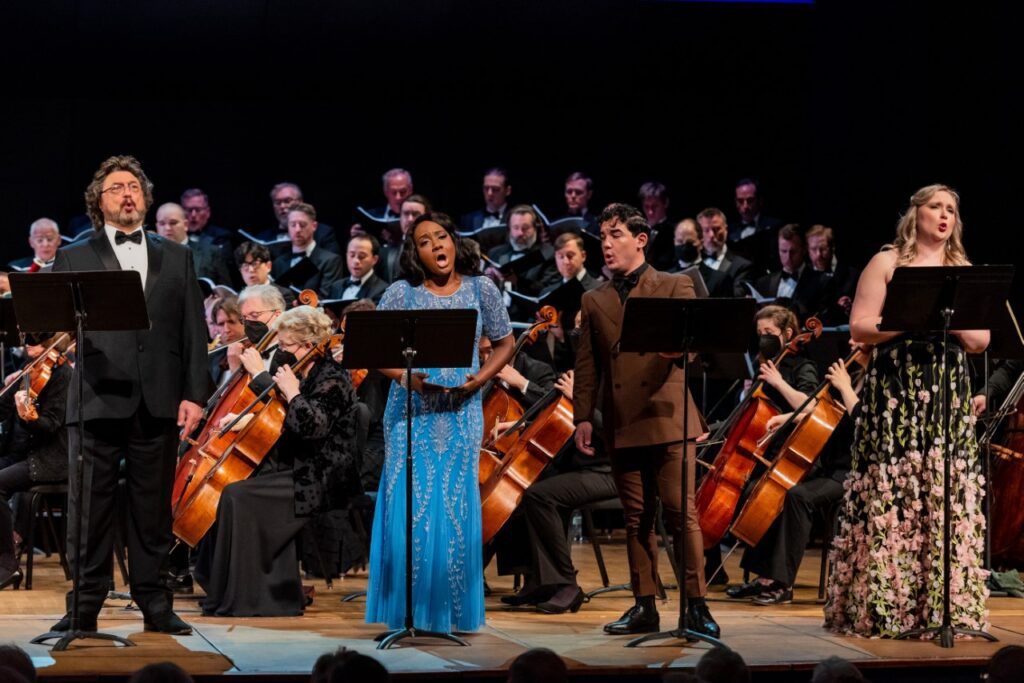Washington Concert Opera’s ‘Nabucco’
By • March 8, 2023 0 1471

After a standing ovation, Washington Concert Opera’s 2022-23 season ended on March 4 with a sing-along in Lisner Auditorium: Artistic Director and Conductor Antony Walker led the orchestra, chorus and audience in “Va, pensiero, sul ali dorate (Fly, thoughts, on golden wings),” the traditional encore at performances of Giuseppe Verdi’s “Nabucco.”
Also known as “Chorus of the Hebrew Slaves,” the tune is much jauntier than the hymn, based on Psalm 137, popularized by the Weavers (“By the waters of Babylon, we lay down and wept”).
A highlight of Verdi’s 1842 opera about the defeat and exile of the Hebrews by Nebuchadnezzar II, “Va, pensiero” has been an anthem for struggles against oppression since the Risorgimento, the mid-19th-century movement to liberate and unify Italy. In Walker’s program book message, he writes: “I would like to dedicate our performance of ‘Va, pensiero’ to displaced peoples worldwide, as well as communities subject to violence and injustice.”
Still in his 20s, Verdi was recovering (or not) from the recent deaths of his infant daughter, his infant son and his wife, plus the failure of his second opera, when Bartolomeo Merelli, manager of Milan’s Teatro alla Scala, handed him a libretto by Temistocle Solera and said, in WCO co-founder Peter Russell’s words: “Here’s the book you’re setting for me, Verdi.”
Based on a ballet based on a play, the libretto interweaves the biblical narrative with the melodrama of royal-family and romantic conflict. Verdi’s score, though often martial in character — recalling the style of Gioachino Rossini — is likewise varied, with lovely instrumental touches and vocal ensembles of six, seven and, at one point, all eight cast members, plus the chorus (prepared by Assistant Conductor and Chorus Master David Hanlon).
The romantic thread is a furtive love between Ismaele, nephew of the King of Jerusalem, sung by Cuban American tenor Andres Acosta, and Nabucco’s daughter Fenena, sung by mezzo-soprano Melody Wilson. The two paired nicely — Acosta’s voice surprisingly strong given his slight build, Wilson’s with a well-supported vibrato, also displayed in Fenena’s Act IV aria as she faces martyrdom.
Three other performers individually commanded the stage at key moments. The first to enter was bass Peter Volpe as the High Priest Zaccaria. A Metropolitan Opera veteran, Volpe embodied the never-wavering, faith-empowered leader of the Hebrews. “Oh what fire flashes out of the old man!” sings the chorus in Act III, when Zaccaria responds to their “Va, pensiero” lamentations.
Another musical high point: Zaccaria’s Act II aria “Tu sul labbro de veggenti (You have spoken through the prophets),” featuring counterpoint by Volpe and principal cello Lori Barnet, later joined by the other five cellos and the two string basses.
In the role of Abigaille, Nabucco’s elder daughter, Greek American soprano Alexandra Loutsion at times seemed to channel Maria Callas’s explosive, bell-like — and pitch-perfect — sound. Full-figured, in a glittering yellow gown, she was the focus of attention in Act I, cursing the young lovers (“The thunderbolt of my revenge hangs over your heads!”). Ismaele’s refusal to choose Abigaille over Fenena, even if it would save his people, launched a nicely balanced trio.
Sung by Loutsion, Abigaille briefly showed a softer side in Act II, tenderly recalling her love for Ismaele, and at the end of the opera, putting her hands on Nabucco’s chest as (spoiler) she dies. But most of the time, she is terrifying.
In Act II, having discovered she is the daughter, adopted by Nabucco, of enslaved parents, Abigaille adds him to her revenge list. Arriving at the palace, Nabucco proclaims himself God. A thunderbolt knocks off his crown and he goes mad. Abigaille then dons the crown and makes him her prisoner.
Her villainy peaks in Act III, when she gets Nabucco in his disordered state to sign a warrant to execute the Hebrews. To his horror, he learns it is also a death warrant for Fenena, who has converted. Mockingly, Abigaille destroys the delegitimizing documentation of her ancestry.
In Act IV, when, in despair, Nabucco prays to the Hebrew God, his mind is restored. The execution is called off, the statue of Baal shatters (not shown), Nabucco pledges to rebuild the Temple and Abigaille, having taken poison, dies as she begs for forgiveness.
As this mini-synopsis indicates, much is asked of the baritone in the title role. At the WCO performance, Lester Lynch had to appear in charge while lined up in Act I with five other cast members: Loutsion, Volpe, Wilson, Acosta and Cafritz Young Artist Teresa Perrotta, a clear-voiced soprano playing Zaccaria’s sister Anna. When Nabucco returns in Act II, Lynch was called upon to abruptly transition from a self-image of divinity into madness and defeat. In these scenes, while singing impressively, he did not always convey the full dramatic impact (in part because concert opera lacks makeup, costumes, props, sets and staging).
Lynch came into his own, however, in the second half. In Act III, his anguished singing as Abigaille’s prisoner was beautiful and moving. His performance as it filled out in Act IV was even better. Nabucco first implores the Hebrew God for help, with solo cello and flute leading into Lynch’s singing of the aria “Dio di Giuda (God of Judah).” Then, as the triumphant and merciful hero of the opera’s conclusion (drum roll, please), Lynch was entirely convincing.
At the performance, Walker announced the two productions of WCO’s next season at Lisner: Rossini’s “Ermione” on Saturday, Dec. 2, 2023, and Giacomo Puccini’s “La Rondine” on Sunday, April 7, 2024.

